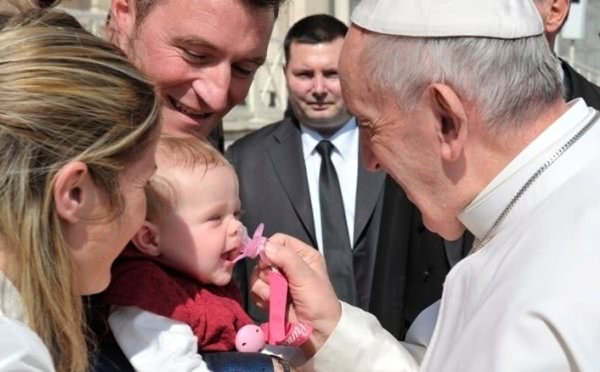Christian hope - 14. Rejoice in hope (cf. Rom 12, 9-13)
Dear Brothers and Sisters, Good morning!
We know well that the great commandment the Lord Jesus left us is the one about love: to love God with all our heart, with all our soul and with all our mind, and to love our neighbor as ourselves (cf. Mt 22:37-39); namely, we are called to love, to exercise charity. And this is our loftiest vocation, our vocation par excellence; and it is also tied to the joy of Christian hope. One who loves has the joy of hope, of reaching the encounter with the great love that is the Lord.
The Apostle Paul, in the passage of the Letter to the Romans that we have just heard, puts us on guard: there is a risk that our charity may be hypocritical, that our love may be hypocritical. So we must ask: when does this hypocrisy happen? And how can we be certain that our love is sincere, that our charity is authentic? That we are not pretending to do charity or that our love is not for show: sincere, strong love....
Hypocrisy can insinuate itself anywhere, even in our world of love. This happens when our love is motivated by interest, by self-interest; and how much interested love there is ... when the service to charity, which we seem to carry out generously, is done in order to draw attention to ourselves or to feel good: ‘Oh, how good I am!’ No, this is hypocrisy! Or also when we aspire to things with “visibility” so as to put our intelligence or our abilities on display. Behind all this there is a false, misleading idea, thinking that since we love, we are good — as though charity were a man-made creation, a product of our heart. Charity, instead, is first and foremost a grace, a gift; being able to love is a gift of God, and we must ask for it. He gives it freely, if we ask for it. Charity is a grace: it does not consist in showing off, but in what the Lord gives us and which we freely receive; and it cannot be extended to others if it is not first generated by the encounter with the meek and merciful face of Jesus.
Paul invites us to recognize that we are sinners, and also that our way of loving is marked by sin. At the same time, however, one becomes the bearer of a new message, a message of hope: the Lord opens before us a new path of freedom, a path of salvation. It is the opportunity for us too to live the great commandment of love, to become instruments of God’s charity. And this happens when we let our heart be healed and renewed by the Risen Christ. The Risen Lord who lives among us, who lives with us is capable of healing our heart: He does so, if we ask it. It is He who allows us, even in our littleness and poverty, to experience the Father’s compassion and to celebrate the wonders of his love. And thus we understand that all we can live and do for our brothers and sisters is but the response to what God has done and continues to do for us. Rather, it is God himself who, abiding in our heart and our life, continues to be close and to serve all those whom we encounter each day on our journey, beginning with the least and the neediest, in whom He is first recognized.
Thus, with these words, rather than reproach us, the Apostle Paul wants to encourage us and rekindle hope in us. Indeed, everyone has the experience of not living the commandment of love fully or as we should. But this too is a grace, because it makes us understand that we are incapable of truly loving by ourselves: we need the Lord constantly to renew this gift in our heart, through the experience of his infinite mercy. Then, indeed, we will return to appreciate small things, simple, ordinary things; we will once more appreciate all these little, everyday things and we will be capable of loving others as God loves them, wanting their good, that is, that they be holy, friends of God; and we will be glad of the opportunity to make ourselves close to those who are poor and humble, as Jesus does with each one of us when we are distant from Him, to stoop to the feet of our brothers and sisters, as He, the Good Samaritan, does with each of us, with his compassion and his forgiveness.
Dear brothers and sisters, what the Apostle Paul reminded us of is the secret for — I shall use his words — it is the secret for “rejoicing in hope” (cf. Rom 12:12); rejoicing in hope. The joy of hope: because we know that in all circumstances, even the most adverse, and also through our own failures, God’s love never fails.
Therefore, with his grace and his fidelity dwelling and abiding in our heart, let us live in the joyful hope of reciprocating in our brothers and sisters, through the little we can, the abundance we receive from Him each day. Thank you.
